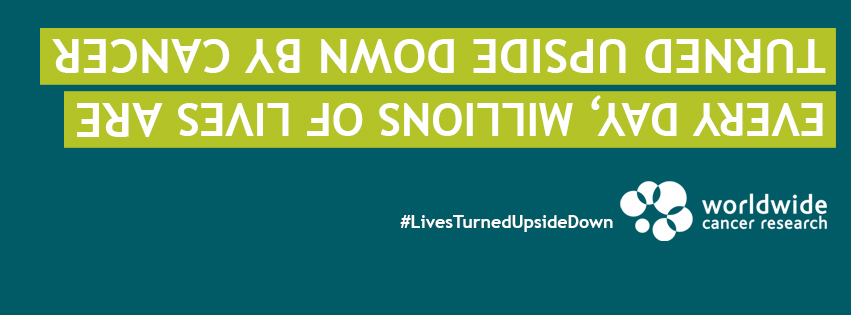
This World Cancer Day we’re turning things upside down because we want people to understand how cancer turns lives upside down, the lives of patients and the lives of their loved ones. We want people to understand why it is important we do all we can to stop cancer diagnoses turning lives upside down – and why we must continue to fund life-changing cancer research. This is our way of saying that we do things a little differently, that we’re not afraid to take a punt on something that is high-risk, high reward. Around the Worldwide Cancer Research office, we often say that we should take a note out of our scientist’s lab book – be innovative, be creative, and chase those bold ideas.
Science really doesn’t have any borders so why should how we fund it?
Last month we announced that we have set up a partnership with another UK charity (The Brain Tumour Charity) to fund vital cancer research all over the world. This is a first for both of us and a rather unique approach to funding science. It’s a truly global collaboration – two UK charities funding scientists in Ireland and Australia. Science really doesn’t have any borders so why should how we fund it? We are called Worldwide Cancer Research because we believe that we should be funding the best science, anywhere in the world – whatever it takes, wherever it takes us. To date we have funded 1800 grants in 34 different countries with a view to moving closer to achieving our vision of no life cut short by cancer.
Our recent partnership with The Brain Tumour Charity symbolises how important it is that we work together. We need to foster these relationships and use them to bring funding bodies from around the world closer. Many charitable organisations have the same ultimate goal, and this is particularly true for those that support cancer research. We all want to ensure that there are more effective treatments, better preventative measures and more accurate ways to diagnose cancer. And the best way to get there is to support the science in every way we can.
Global access to research
In BMC journals, our researchers have published work on how breast cancer cells become invasive, how epigenetics could be used to help diagnose skin cancer, and the underlying biology of a rare paediatric cancer.
For nearly 40 years Worldwide Cancer Research has been funding basic and translational research across the world. We encourage all our researchers to publish open access, and a key part of the agreement between us and the scientists is that they make all research publically available for free no later than six months after publishing. This is really important to us as all our research is funded by public donations. Open access publications mean that our supporters, the ones who have reached in their pockets to fund the work, are able to read the research.
We are delighted that our researchers also choose to publish in dedicated open access journals. In BMC journals, our researchers have published work on how breast cancer cells become invasive, how epigenetics could be used to help diagnose skin cancer, and the underlying biology of a rare paediatric cancer.
Beyond our borders
Worldwide Cancer Research have just last month announced that they have committed nearly £4 million of publically raised money to fund 20 new cancer research projects. The research projects are being carried out in labs all over the world including the UK, US, Argentina, Europe and Australia and cover many different types of cancer. This will take our current portfolio of research to 113 projects, in 82 institutes, across 17 countries.
Every day, across the world, millions of lives are turned upside down by cancer. In order to help us raise awareness for the global research that is vital for improving outcomes for people with cancer you can mark the day and show your support for Worldwide Cancer Research by turning your tweets, profile pics, websites, front pages or signage upside down for the day (find out how to get involved here). Only by continued support for research will we live in a world where no life is cut short by cancer.
Comments